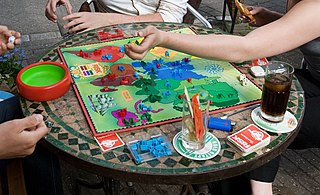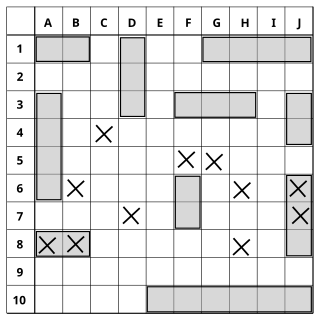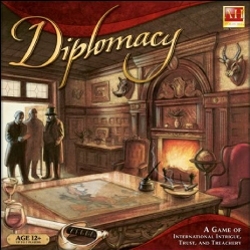
Sternhalma, commonly known as Chinese checkers or Chinese chequers, is a strategy board game of German origin that can be played by two, three, four, or six people, playing individually or with partners. The game is a modern and simplified variation of the game Halma.

Risk is a strategy board game of diplomacy, conflict and conquest for two to six players. The standard version is played on a board depicting a political map of the world, divided into forty-two territories, which are grouped into six continents. Turns rotate among players who control armies of playing pieces with which they attempt to capture territories from other players, with results determined by dice rolls. Players may form and dissolve alliances during the course of the game. The goal of the game is to occupy every territory on the board and, in doing so, eliminate the other players. The game can be lengthy, requiring several hours to multiple days to finish. European versions are structured so that each player has a limited "secret mission" objective that shortens the game.

A capital market is a financial market in which long-term debt or equity-backed securities are bought and sold, in contrast to a money market where short-term debt is bought and sold. Capital markets channel the wealth of savers to those who can put it to long-term productive use, such as companies or governments making long-term investments. Financial regulators like Securities and Exchange Board of India (SEBI), Bank of England (BoE) and the U.S. Securities and Exchange Commission (SEC) oversee capital markets to protect investors against fraud, among other duties.
Scotland Yard is a board game in which a team of players controlling different detectives cooperate to track down a player controlling a criminal as they move around a board representing the streets of London. It was first published in 1983. It is named after Scotland Yard - the headquarters of London's Metropolitan Police Service in real-life. Scotland Yard is an asymmetric board game, during which the detective players cooperatively solve a variant of the pursuit–evasion problem. The game is published by Ravensburger in most of Europe and Canada and by Milton Bradley in the United States. It received the Spiel des Jahres award in 1983 - the same year that it was published.

In finance, a bond is a type of security under which the issuer (debtor) owes the holder (creditor) a debt, and is obliged – depending on the terms – to repay the principal of the bond at the maturity date as well as interest over a specified amount of time. The interest is usually payable at fixed intervals: semiannual, annual, and less often at other periods. Thus, a bond is a form of loan or IOU. Bonds provide the borrower with external funds to finance long-term investments or, in the case of government bonds, to finance current expenditure.

A zero coupon bond is a bond in which the face value is repaid at the time of maturity. Unlike regular bonds, it does not make periodic interest payments or have so-called coupons, hence the term zero-coupon bond. When the bond reaches maturity, its investor receives its par value. Examples of zero-coupon bonds include US Treasury bills, US savings bonds, long-term zero-coupon bonds, and any type of coupon bond that has been stripped of its coupons. Zero coupon and deep discount bonds are terms that are used interchangeably.

A government bond or sovereign bond is a form of bond issued by a government to support public spending. It generally includes a commitment to pay periodic interest, called coupon payments, and to repay the face value on the maturity date.

A municipal bond, commonly known as a muni, is a bond issued by state or local governments, or entities they create such as authorities and special districts. In the United States, interest income received by holders of municipal bonds is often, but not always, exempt from federal and state income taxation. Typically, only investors in the highest tax brackets benefit from buying tax-exempt municipal bonds instead of taxable bonds. Taxable equivalent yield calculations are required to make fair comparisons between the two categories.

Battleship is a strategy type guessing game for two players. It is played on ruled grids on which each player's fleet of warships are marked. The locations of the fleets are concealed from the other player. Players alternate turns calling "shots" at the other player's ships, and the objective of the game is to destroy the opposing player's fleet.
Advanced Third Reich is a board wargame originally designed by Bruce Harper as a simulation of the European and African theatres of World War II. The game was published by Avalon Hill, who then sold the license to Hasbro, and was marketed as "the ultimate World War II strategy game". Advanced Third Reich is a rewrite of Rise and Decline of the Third Reich (1974), incorporating and developing many suggestions which had been published in The General since the early 1980s, improving ease of play and historical realism.

In finance, the yield curve is a graph which depicts how the yields on debt instruments - such as bonds - vary as a function of their years remaining to maturity. Typically, the graph's horizontal or x-axis is a time line of months or years remaining to maturity, with the shortest maturity on the left and progressively longer time periods on the right. The vertical or y-axis depicts the annualized yield to maturity.

A corporate bond is a bond issued by a corporation in order to raise financing for a variety of reasons such as to ongoing operations, M&A, or to expand business. The term is usually applied to longer-term debt instruments, with maturity of at least one year. Corporate debt instruments with maturity shorter than one year are referred to as commercial paper.

1914 is a board wargame published by Avalon Hill in 1968 that simulates the first few months of World War I on the Western Front.

Wallenstein is a medium-weight German-style board game designed by Dirk Henn and published by Queen Games in 2002. Though set during the Thirty Years' War, Wallenstein should not be confused with a complex wargame. Rather, it has the feel of a light strategy game with the familiar Euro elements of area control and resource management mixed in. As such, it has a wide range of appeal that attracts wargamers and non-wargamers alike.

Twilight Imperium is a strategy board game produced by Fantasy Flight Games in the genre of science fiction and space opera. It was designed by Christian T. Petersen and was first released in 1997. The game is in its fourth edition (2017), which has large changes over previous editions. It is known for the length of its gameplay, and its in-depth strategy.

Britannia is a strategy board game, first released and published in 1986 by Gibsons Games in the United Kingdom, and The Avalon Hill Game Company in 1987 in the United States, and most recently updated in late 2008 as a re-release of the 2005 edition, produced by Fantasy Flight Games. It broadly depicts the wars in, and migrations to, the island of Great Britain in the centuries from the Roman invasions to the Norman Conquest.

Walther M. Gerdts, known as Mac Gerdts, is the designer of German-style board games such as Imperial, Imperial 2030, Antike and Hamburgum. His games introduced the concept of a rondel rather than dice as a mechanism for play. This is designed to prevent players from repeatedly taking the same action in quick succession without paying a cost.

Diplomacy is a strategic board game created by Allan B. Calhamer in 1954 and released commercially in the United States in 1959. Its main distinctions from most board wargames are its negotiation phases and the absence of dice and other game elements that produce random effects. Set in Europe in the years leading to the Great War, Diplomacy is played by two to seven players, each controlling the armed forces of a major European power. Each player aims to move their few starting units and defeat those of others to win possession of a majority of strategic cities and provinces marked as "supply centers" on the map; these supply centers allow players who control them to produce more units. Following each round of player negotiations, each player can issue attack and support orders, which are then executed during the movement phase. A player takes control of a province when the number of provinces that are given orders to support the attacking province exceeds the number of provinces given orders to support the defending province.
Machiavelli is a strategic board game created by S. Craig Taylor and James B. Wood, and released commercially in 1977 by Battleline Publications, later taken over in 1980 by Avalon Hill, who are currently owned by Hasbro. Set in Renaissance Italy, the board is controlled by the Republic of Florence, the Republic of Venice, the Duchy of Milan, the Kingdom of Naples, the Papacy, Valois France, Habsburg Austria, and the Ottoman Turks.

Star Wars: Rebellion is an asymmetrical strategy board game designed by Corey Konieczka and published by Fantasy Flight Games in 2016. The game's setting is inspired by the original Star Wars trilogy. Players control either the Galactic Empire or the Rebel Alliance. Each player pursues a different path to victory, with the Galactic Empire playing seeking to find the Rebel Alliance player's base and destroy it, while the Rebel Alliance player attempts to avoid detection by the Galactic Empire and sabotage their efforts. The game received highly positive reviews and won numerous awards.















